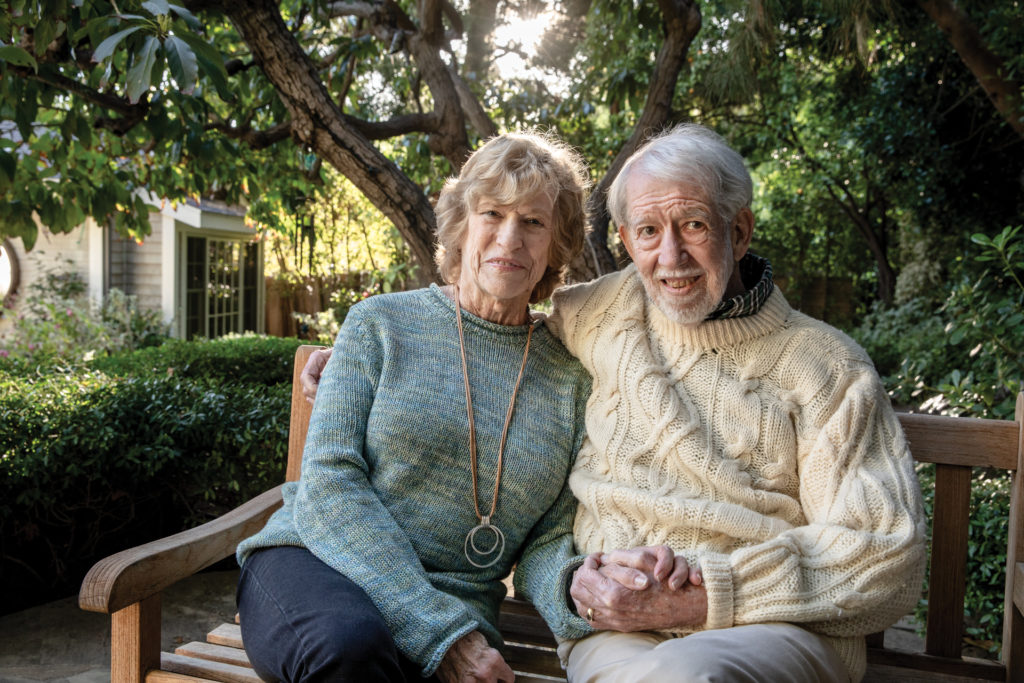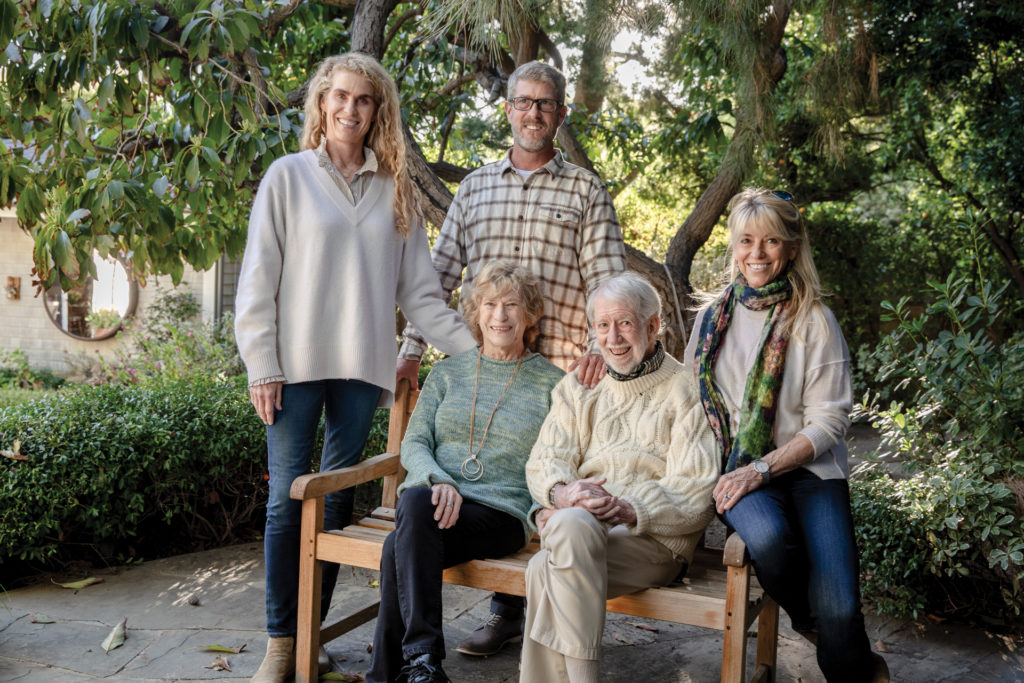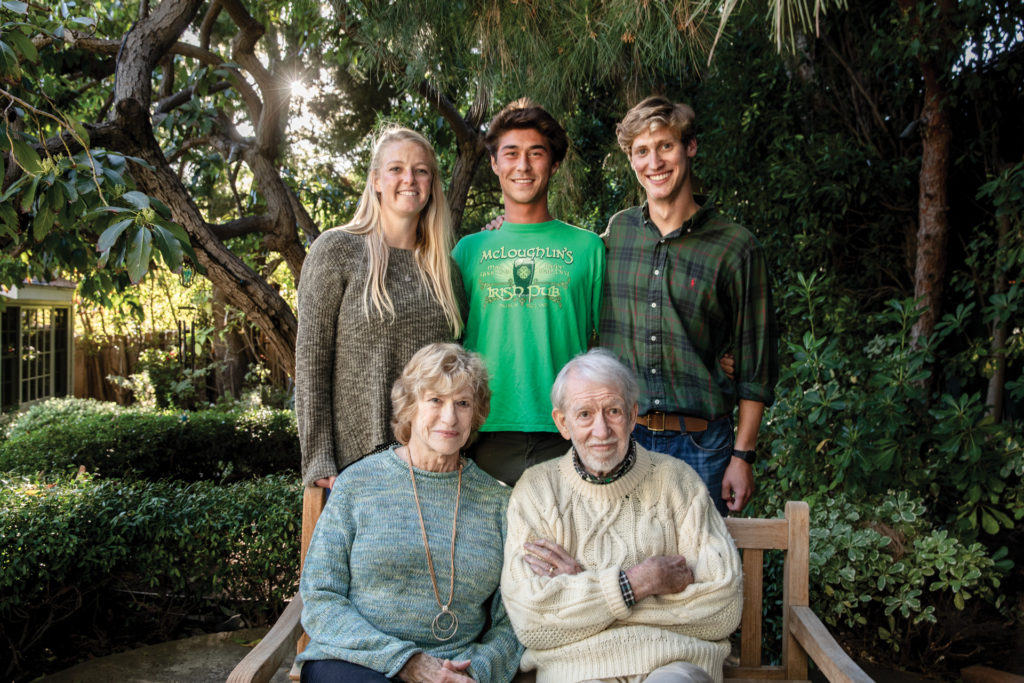Paying it Forward
Thankful for medical research that has benefited them, the McLoughlin family donates to help others.

BY NANCY SOKOLER STEINER / PHOTOGRAPHED BY PHILLIP GRAYBILL
Barbara and John McLoughlin have turned to Providence Saint John’s Health Center for their medical needs for close to six decades. A year after the couple moved to Santa Monica from the East Coast in 1962, Barbara delivered daughter Linda at Saint John’s. Siblings Patty, Cathy and Mike followed—all making their debut at the “family” hospital. Funds were tight in those early days with John just out of law school. Before delivering her third baby, Barbara insisted they wait in the car even as her contractions grew closer together. It was late in the evening, and she didn’t want to pay for an extra night. Today, the couple’s finances are secure. And in appreciation for research at Saint John’s that has benefited them directly, Barbara and John recently made a generous gift to support the work of three exceptional Saint John’s physicians, including a longtime friend of the family, geriatric psychiatrist David Merrill, MD, PhD, director of the Pacific Brain Health Center at Pacific Neuroscience Institute (PNI). The McLoughlins met Dr. Merrill when John, retired from his successful career as a corporate attorney, began experiencing mild cognitive decline. John started receiving care from Dr. Merrill, who was then working at another institution. “My dad is a very bright, very cerebral, very accomplished man,” says daughter Linda McLoughlin Figel. “Dr. Merrill was just so amazing in helping us navigate those early stages, explaining what was involved and what it meant for my dad and our family.” Impressed with Dr. Merrill’s research and grateful for his care, John and Barbara made their first substantial philanthropic donation, a five-year grant to fund Dr. Merrill’s work on slowing cognitive decline. When he moved to Saint John’s in 2018, the funding followed him to PNI. The McLoughlin family this year renewed their pledge with another five-year grant. “The McLoughlins were a significant part of the reason I came here,” says Dr. Merrill. “They spoke enthusiastically about the hospital and the doctors, and that made me feel comfortable joining the Saint John’s family.” John’s treatment involves efforts “to slow down his cognitive decline and optimize his physical health,” says Dr. Merrill. “I work with him, Barbara and their children, as well as his other doctors, to address any issues and keep his outlook positive.” John’s regimen combines medications for brain function and healthy lifestyle behaviors including exercise, a Mediterranean diet, minimizing stress and engaging in cognitively enriching activities such as reading financial news and reminiscing with his family. When John first came to Dr. Merrill, his son, Mike, asked how much time his father had remaining. Dr. Merrill estimated two years. That was 10 years ago. That’s why, when the McLoughlin’s gift to Dr. Merrill approached its completion at the end of 2020, Barbara insisted on renewing funding. Her children enthusiastically supported the decision. “Dr. Merrill’s research,” says Linda, “really spoke to us.” “We’ve been studying and developing an on-site program where people perform cognitive training and physical exercise simultaneously. That seems to help both memory and frontal executive function in older adults at risk for memory loss,” says Dr. Merrill. “We hope this brain training will slow down the progression of Alzheimer’s disease in those who already have it and may become part of a prevention protocol for those at risk. The McLoughlin’s gift will help support these prevention trials.” “This program was built from donor contributions,” he adds. “Without philanthropy, we don’t have the funds to develop novel lifestyle programs. We’re looking to get the program covered by health insurance, but that’s a long process and we need good data from our pilot studies, which are donor-funded.” Along with their renewed support of Dr. Merrill’s work, the McLoughlins have directed half of their gift toward research on urologic cancers. Receiving the funds are Saint John’s Cancer Institute physicians Jennifer Linehan, MD, associate professor of urology and urologic oncology, and Przemyslaw Twardowski, MD, professor of medical oncology at the Cancer Institute. Three years ago, Barbara was rushed to Saint John’s emergency room with severe abdominal pains. Dr. Linehan diagnosed her with upper tract urothelial carcinoma, a rare form of bladder cancer that reached up to the kidney.
“They’re an incredibly tight and supportive family. That makes a huge difference in terms of patient recovery—more than people realize.”

“This cancer can be very aggressive,” says Dr. Linehan. She removed Barbara’s kidney to prevent spread of the tumor, which was about the size of a grain of sugar. But the cancer still metastasized to the liver. Dr. Twardowski then started treating Barbara with chemotherapy. “The chemotherapy reduced her cancer by about 20% to 30%, but it was difficult for her to endure because of the side effects,” says Dr. Twardowski. He switched Barbara to a new immunotherapy drug that had only recently been approved. In fact, Dr. Twardowski had participated in the clinical trials leading to that approval. “This treatment only works for about 20% of patients, so the odds weren’t in her favor,” he says. “But for that 20%, we see a dramatic, prolonged and durable effect.” Fortunately, Barbara beat the odds. After five treatments, her liver cancer completely disappeared. “This shows the progress in the application of new drugs,” says Dr. Twardowski. “Five years ago, this option wasn’t available.” Dr. Linehan and Dr. Twardowski credit Barbara’s family with helping her surmount the challenges of treatment. “Her family takes incredible care of her. At least one of her children was always with her,” Dr. Linehan says, referring to Linda, Patty and Mike (Cathy lives out of town). “They would come to appointments together and ask really intelligent questions.” Dr. Twardowski agrees. “They’re an incredibly tight and supportive family. That makes a huge difference in terms of patient recovery—more than people realize.” “Dr. Linehan and Dr. Twardowski saved my mom’s life,” says Mike. “They were very comprehensive with explaining our options and they were always responsive when we would call or email with questions.” (Mike himself received lifesaving care at Saint John’s for a previously undetected hole in his heart.)

“A donation like this allows you to do the preliminary work that you can then take to the government to demonstrate you’ve made some headway.”
Dr. Linehan explains that there is no way to find kidney cancer from blood or urine samples, making detection and monitoring an intrusive process for patients. She is working to identify specific biomarkers, or indicators, in blood or urine that would signal cancer’s presence. She will use the funding from the McLoughlins to continue this research. “A donation like this allows you to do the preliminary work that you can then take to the government to demonstrate you’ve made some headway,” says Dr. Linehan. “Only then can you start to get National Institute of Health grants. These kinds of donations can be a huge stepping-stone.” Dr. Twardowski will apply the funds toward research on prostate cancer, the most common type of urologic cancer. His projects include looking at the anticancer properties of a mushroom extract (see page 17) as well as conducting clinical trials to see if administering two immunotherapy drugs (currently used for other cancers) improves outcomes when given to high-risk prostate cancer patients before surgery. Barbara and John McLoughlin understand the importance of philanthropy and admire how well it is utilized in their own backyard. “This donation felt very personal to my parents,” says Linda. “Saint John’s is their local hospital, where they’ve been in good times and bad. It doesn’t feel like sending off a check someplace where you never see it. They feel a real connection here.”
